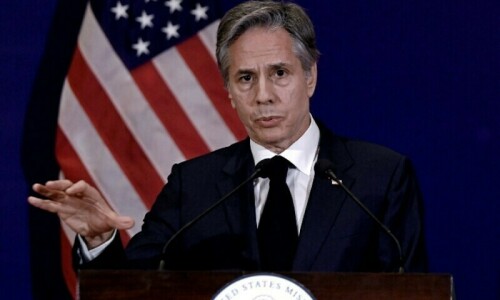WASHINGTON: After Pyongyang’s firing of a long-range missile escalated tensions just days before the US election, the United States reported on Thursday that up to 8,000 North Korean troops had reached Russia’s border region with Ukraine and were prepared for combat.
Russia has not hosted foreign troops on its soil in more than a century, and President Vladimir Putin has brought in troops from North Korea in order to take advantage of his relentless invasion of Ukraine.
Secretary of State Antony Blinken stated, citing US intelligence, that approximately 8,000 of the 10,000 North Korean troops believed to be in Russia have reached the Kursk border region.
After four-way talks with the South Korean foreign and defense ministers, Blinken told a news conference, “We’ve not yet seen these troops deploy into combat against Ukrainian forces, but we would expect that to happen in the coming days.” This statement came after the four-way talks.
According to Blinken, Russia has been instructing North Korean troops in the use of artillery, drones, basic artillery operations, trench clearing, and other skills. This, in turn, “indicates that they fully intend to use these forces in frontline operations.”
According to Defense Secretary Lloyd Austin, Russian uniforms were being provided to North Korean troops.
Austin stated, “Make no mistake, these North Korean troops would make themselves legitimate military targets if they engage in combat or combat support operations against Ukraine.” He added that in light of the North Korean troops’ arrival, the United States was also preparing a new package of military assistance for Ukraine.
Outrage in Ukraine In an interview with South Korean media, Ukraine’s President Volodymyr Zelensky criticized the “inaction by allies” and expressed surprise at China’s “silence” regarding the deployment of North Korean troops.
“I believe that there will be no response to this; It has been zero, according to Zelensky.
South Korea has stated that it is evaluating the possibility of sending weapons directly to Ukraine as a response. This is an idea that it has previously rejected due to a long-standing domestic policy that prevents it from sending weapons into active conflicts.
Yang Moo-jin, president of the University of North Korean Studies in Seoul, stated, “seems to have been carried out to divert attention from international criticism of its troop deployment.”



